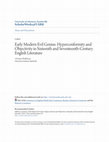Papers by Christine Hoffmann

Stupid Humanism
This chapter examines twenty-first-century negative political advertisements alongside early mode... more This chapter examines twenty-first-century negative political advertisements alongside early modern representations of folly, particularly the Folly who speaks at length in Erasmus’s Praise of Folly. Much of the chapter is devoted to deconstructing political candidates’ required statements of disclosure, which force them to “approve” all the horrors rehearsed in the rest of their negative ads. Thus twenty-first-century attack ads echo several of the lessons Folly teaches in her long encomium to herself, the chief one being that praising the self while panning the other is always an exercise in folly. However, witnesses to this exercise may find in it a reason to engage more generously with the politics of knowledge. When we read negative political ads as Erasmian gestures, we may recognize what is alluring, even precious, about rhetorical philosophies that favor not orderly, intelligible communities but profoundly, dramatically—laughably—indistinct ones.
Stupid Humanism
The introduction defines humanism as an inherently stupid philosophy and offers stupid humanism a... more The introduction defines humanism as an inherently stupid philosophy and offers stupid humanism as the more fitting term for a philosophy that takes seriously, and literally, the idea of living a full life. Spam, both the noun and the verb, is offered as a useful metaphor for copia as overacting, overdoing, overselling, overstuffing. To contemplate spam is to consider how and why we develop an appetite for what cannot sustain us, fails to satisfy us and even threatens to make us sick. Spam is, by definition, unsolicited and uncalled for material, and for modern internet-users, spam is also unavoidable. But even sixteenth-century audiences could not avoid encounters with spam—not if they practiced copious rhetoric. Copia teaches eloquence through exercises in over-abundance. It recognizes variety—and the controversy that stems from it—as the beating heart of humanism.

Using memes as its primary (stupid) material for analysis, this chapter outlines the instructive ... more Using memes as its primary (stupid) material for analysis, this chapter outlines the instructive possibilities of a stupid humanism working against the grain of progress-focused activism, historicizing and self-fashioning. The chapter takes on some of the contradictions of copia, a rhetorical theory that promotes stability, correspondence and perfect knowledge, but which in practice often results in transgression and fragmentation. Copia—in both the early modern period and today—is both an impossible project and a queer project: impossible because it positions the writer/creator/subject outside of the teleological history whose all-inclusiveness it purports to celebrate; queer because this instability permits a suspension of chronological distinction in favor of anachronistic encounters between subjects and history. Recognizing the queer time of memes is one way to violate traditional notions of history, oppose too-neat theories of correspondence, and muddle our way toward a middle ...
SubStance
This essay argues that amidst the superfluous clutter of spam is a credible ethos combining the p... more This essay argues that amidst the superfluous clutter of spam is a credible ethos combining the poetic consolation of the early modern sonneteer with the indulgent excesses of a capitalist precariat. William Shakespeare’s Will sonnets (135 and 136) are explored as early instances of spam in that they illustrate spam’s peculiar objective to deploy itself into fields of lively but redundant engagement. While experimenting with the conventions of the sonnet, an outmoded genre devoted to the particular disillusionment of precarious romance, Shakespeare recomposes willfulness as a critical ethos designed to function as a form of life in both emotional and material environments that prove hazardous to conventional forms of intimacy and survival.

PMLA
By examining twenty-first-century negative political advertisements alongside Shakespearean fools... more By examining twenty-first-century negative political advertisements alongside Shakespearean fools and Erasmian folly, we can read attack ads not as barren clichés but as parables about the slippages—between subject and object, villain and hero, insider and outsider—that make possible more-generous appraisals of folly and that offer glimpses of a humanist program based on folly's benevolence. When we read such ads as Erasmian gestures—more than that, when we recognize our entanglements in the foolish maneuverings of our political leaders—we confront the possibility that giving in to the incongruities of folly is more productive than insisting on a knowing, superior sufficiency. To recognize the incapacitating, unconventional properties of folly is to affirm what is alluring, even precious, about rhetorical philosophies that favor not orderly, intelligible communities but profoundly, dramatically—laughably—indistinct ones.

Shakespeare's dialogue tweaks the familiar correspondence in the early modern period between body... more Shakespeare's dialogue tweaks the familiar correspondence in the early modern period between body and book. Viola introduces Orsino as a-hybridization between the human organism and technology‖ (Marcus 23), a clever but already entirely familiar image, and one that derives from-two core metaphors: the book of nature and the body as a network which replicates the order of the world beyond it‖ (Rhodes 187). Nature is a book, the human body a microcosm of created Nature, thus body, book and world correspond.-[P]eople in early print culture often thought of themselves … as writing, or as half-human, half-book,‖ says Leah Marcus (23). 1 Neil Rhodes agrees, and points to John Donne as a particularly avid user of book metaphors to show how the relationship between self and world-is textually mediated‖ (192): all mankind is of one author, and is one volume; when one man dies, one chapter is not torn out of the book, but translated into a better language; and every chapter must be so translated; God employs several translators; some pieces are translated by age, some by sickness, some by war, some by justice; but God's hand is in every translation, and his hand shall bind up all our scattered leaves again for that library where every book shall lie open to one another. (Meditation XVII 445) 10 The phrase-rhetoric of assertion‖ I take from Gary Olson's-Toward a Post-Process Composition: Abandoning the Rhetoric of Assertion.‖ In composition studies, Olson says,-[t]he technology of assertion seems ubiquitous,‖ and-despite our attempts to introduce alternative genres, to help students become more dialogic and less monologic, more sophistic and less Aristotelian, more exploratory and less argumentative, more personal and less academic, the Western, rationalist tradition of assertion and support is so entrenched in our epistemology and ways of understanding what ‗good' writing and ‗thinking' are that this tradition, along with its concomitant assumptions, defies even our most concerted efforts to subvert it‖ (235). 11 The phrase rhetoric of struggle I derive from Diane Davis' Breaking Up [at] Totality: a Rhetoric of Laughter. Davis agrees with Olson that-[w]riting gets codified, disciplined, domesticated in the typical composition course; indeed, writing is often sacrificed in the name of 'composition,' in the name of this ‗discipline's' service-oriented and pre-established requirements‖ (6). In opposition to-a style of writing that is allowed (or, really, required) to efface what it exscribes‖ (13-14), Davis proposes a nondisciplinary rhetoric that creates-pattern[s] of connection based on coordination rather than subordination‖ (108).

Papers on Language Literature, Sep 22, 2009
Shakespeare's contemporary Edmund Spenser dedicates an entire book of his Faerie Queene to cr... more Shakespeare's contemporary Edmund Spenser dedicates an entire book of his Faerie Queene to criminal Justice. His knight, Sir Artegall, is educated in the virtue by Astraea, a former immortal who kidnaps Artegall as a child, rears him apart from civilization in an isolated cave, and there teaches him the secrets of heavenly justice. Artegall practices his judicial skills "vpon wyld beasts" (5.1.7) (1) until, his training finally complete, he reenters the unfamiliar human world from which he was abducted. Spenser's knight of Justice disciplines and punishes his way through book 5 with a ruthlessness that is often bewildering, linked as he is to his "immoueable, resistlesse" man of iron, Talus (5.1.12). Ultimately, it is Artegall's disconnection from civilization--initially provided by Astraea and consistently reinforced by Talus--and thus his disconnection from the taint of criminal activity bred in such an inevitably debased atmosphere, that gives him the authority to criminalize. If we find no men of iron in Shakespeare's history plays, we do find a similar concern for an efficient system of judgment and justice. More particularly, in Shakespeare's kings we find the similar assumption that disconnection from civilization is necessary if good judgment is to appear, and that "vile participation," of which Henry IV accuses Prince Hal in 1 Henry IV, will cause any royal to lose his "princely privilege" (3.2.86-87). (2) It is an uncomfortable hypothesis, one that Foucault implicitly urges us to discard in his efforts to describe privilege or power as "exercised rather than possessed" (26). We must, according to Foucault, "abandon a whole tradition that allows us to imagine that knowledge can exist only where the power relations are suspended [...]" (27), and this includes knowledge of criminal activity. Prince Hal, after the accusation of "vile participation," promises his father to remove himself from "common sight" (3.2.88) and to "be more myself" (93)--self-knowledge in this case depends on distance from all the other "selves" whose company Hal has previously seemed to enjoy, depends on a suspension of participation in favor of a static appreciation for an equally static royal privilege. But according to Foucault the development of any knowledge hinges inevitably on participation in what he calls "power-knowledge relations" (27). Neither power nor knowledge exists alone as either privilege or property, but as strategy and activity (26). (3) Unlike Spenser's work, Shakespeare's history plays were not explicitly written as guidebooks for hopeful courtiers. Yet his works on the Lancastrian ascendance include portraits of characters confronted with similar questions of how to rule, to judge, and thus to punish nobly, virtuously, and effectively. More often than not, Shakespeare's royals exercise poor judgment because of their very assumptions about the vileness of participation. It is when they are most eager to remove themselves from the taint of a despoiled social order that they reveal their own relations to it most undeniably, for the "crimes" they are quickest to condemn are "crimes" of participation--Bolingbroke and Mowbray, Exton, Hotspur, and Falstaff are deemed "vile" by the grossly physical reminders they display of their own associations with the material world. The criminals in Richard II and 1 and 2 Henry IV possess hearty and very literal appetites; the justice sought against them is a reaction to and against an intemperate, immoderate participation in the physical world. Justice and Temperance are linked in these plays as immediately and insistently as they are in The Faerie Queene. In that work, Spenser's knight of Temperance, Sir Guyon, is gradually educated in the virtue, and it is such a thorough education that allows him, in the last of the cantos dedicated to him, to administer a justice that stems immediately from his earthbound experiences. His destruction of the villainous Acrasia's Bower of Bliss, while not as gruesomely violent an act as many of Sir Artegall's punishments, is certainly as severely absolute. …
SubStance, 2021
This essay argues that amidst the superfluous clutter of spam is a credible ethos combining the p... more This essay argues that amidst the superfluous clutter of spam is a credible ethos combining the poetic consolation of the early modern sonneteer with the indulgent excesses of a capitalist precariat. William Shakespeare’s Will sonnets (135 and 136) are explored as early instances of spam in that they illustrate spam’s peculiar objective to deploy itself into fields of lively but redundant engagement. While experimenting with the conventions of the sonnet, an outmoded genre devoted to the particular disillusionment of precarious romance, Shakespeare recomposes willfulness as a critical ethos designed to function as a form of life in both emotional and material environments that prove hazardous to conventional forms of intimacy and survival.

By examining twenty-first-century negative political advertisements alongside Shakespearean fools... more By examining twenty-first-century negative political advertisements alongside Shakespearean fools and Erasmian folly, we can read attack ads not as barren clichés but as parables about the slippages—between subject and object, villain and hero, insider and outsider—that make possible more-generous appraisals of folly and that offer glimpses of a humanist program based on folly’s benevolence. When we read such ads as Erasmian gestures—more than that, when we recognize our entanglements in the foolish maneuverings of our political leaders—we confront the possibility that giving in to the incongruities of folly is more productive than insisting on a knowing, superior sufficiency. To recognize the incapacitating, unconventional properties of folly is to affirm what is alluring, even precious, about rhetorical philosophies that favor not orderly, intelligible communities but profoundly, dramatically—laughably—indistinct ones. (CH)
Rhizomes: Cultural Studies in Emerging Knowledge, Jan 2014
Eclectica Magazine, Jan 2013
Papers on Language and Literature, 2009
The CEA Forum, Jan 1, 2010
―A tedious brief scene of young Pyramus And his love Thisby; very tragical mirth.‖ Merry and trag... more ―A tedious brief scene of young Pyramus And his love Thisby; very tragical mirth.‖ Merry and tragical? Tedious and brief? That is hot ice and wondrous strange snow. How shall we find the concord of this discord? -Theseus, A Midsummer Night's Dream ... The social networking ...
The Missouri Review, Jan 1, 2006
Picaresque novels thrived in the eighteenth century: naïve heroes and heroines struggled, often c... more Picaresque novels thrived in the eighteenth century: naïve heroes and heroines struggled, often comically, against a hostile society, and they either adapted to it or further distanced themselves from it. Working within such a long-established tradition, the best contemporary novels ...
The Missouri Review, Jan 1, 2006
Nancy Zafris, fiction editor of the Kenyon Review, author of The Metal Shredders and winner of th... more Nancy Zafris, fiction editor of the Kenyon Review, author of The Metal Shredders and winner of the Flannery O'Connor Award for Short Fiction, adds to a notable list of credentials with her second novel, Lucky Strike. The setting is 1950s Utah, site of the Cold Warprovoked ...











Uploads
Papers by Christine Hoffmann